DOBOJ – When the “Sveti apostol Luka” hospital in Doboj procures food products, it hasn't been a question for years about who will win the tender. The fact that “Univerzal-DO” from Doboj and the Banja Luka-based company “Novo-teks” regularly secure the contracts has become a practice to which even the competition has resigned. They say there's no point in complaining because the tender documentation is always prepared in a way that the favourites are known in advance.
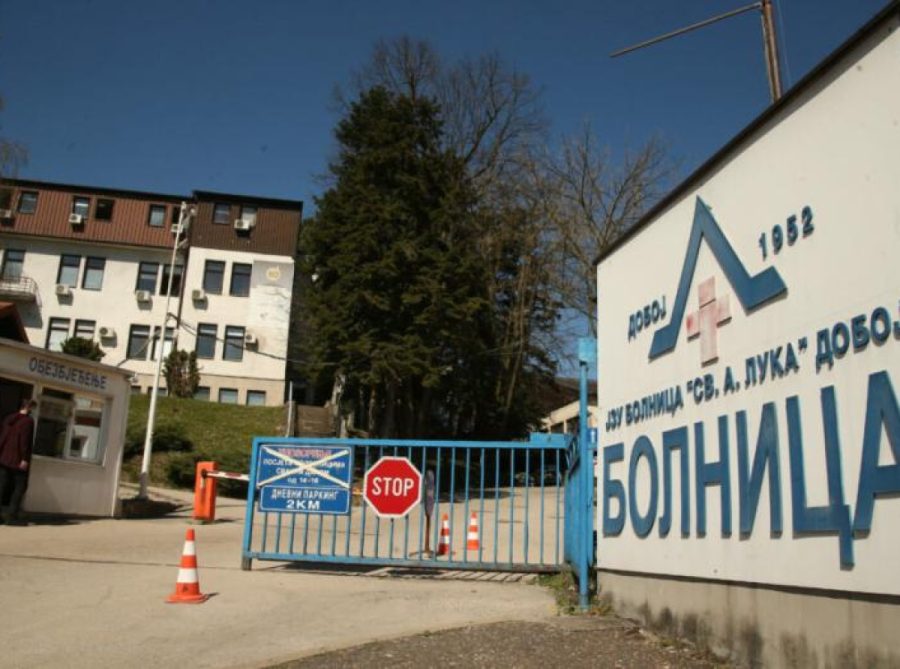
To satisfy both “champions of public procurement” of the Doboj hospital, not one but even two tenders are announced simultaneously, although it's for the same procurement item.
This was the case even in October last year when the contract worth nearly 550 thousand KM for the procurement of food for patients was awarded to the Doboj-based company, while almost simultaneously, a public procurement contract worth approximately 235 thousand KM, excluding VAT, was awarded to the bidder from Banja Luka.
The Goods Are the Same, But the Tender Conditions Aren't
In October of last year, the Public Health Institution “Sveti apostol Luka” Hospital in Doboj announced two tenders with the same subject – “food products for patient meals”.
Although one tender was announced in mid-September and the other just two weeks later, the conditions for participation in these competitions stated in the tender documents are drastically different. According to experts in public procurement, this isn't surprising; it's a way to “accommodate” certain bidders.
In the tender announced on September 15, 2023, the total procurement value was estimated at 541,900 KM excluding VAT.
As a condition for participation in the tender, among other requirements, bidders were asked to prove that in the previous two years, through a maximum of three contracts, they had executed contracts related to this procurement subject totalling no less than the estimated value of this public procurement.
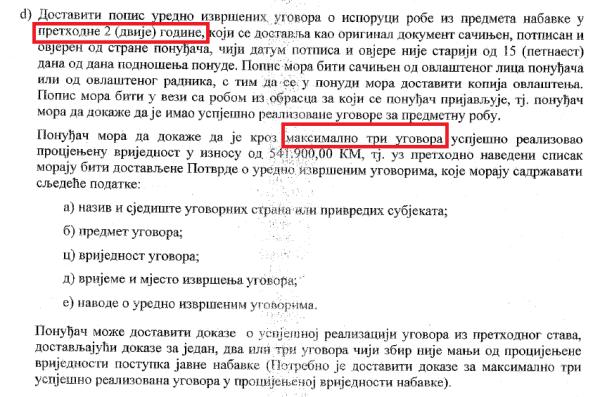
Just two weeks later, the same contracting authority, in another tender for the procurement of food products with a total estimated value of 235,500 KM, specified completely different conditions.
However, this time, bidders were required to have executed contracts in the previous three years with a total value not less than the estimated value of the procurement, through a maximum of two executed contracts.
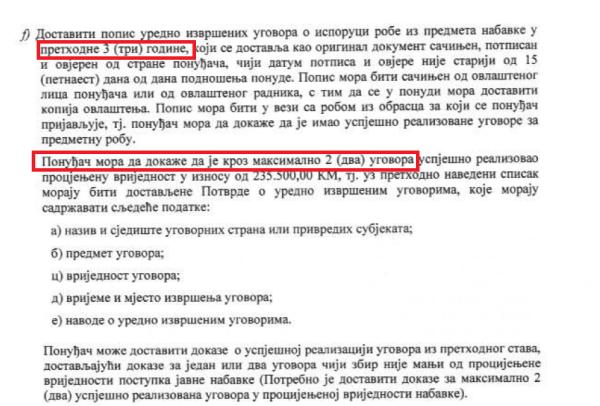
In both cases, bidders were required to submit photographs of the products they offered, clearly showing the product labels.
In just two days, the director of the “Sveti apostol Luka” Hospital in Doboj, Mladen Gajić, signed two decisions selecting the most favourable bidder for the procurement of goods – food items for patient meals in this public healthcare institution.
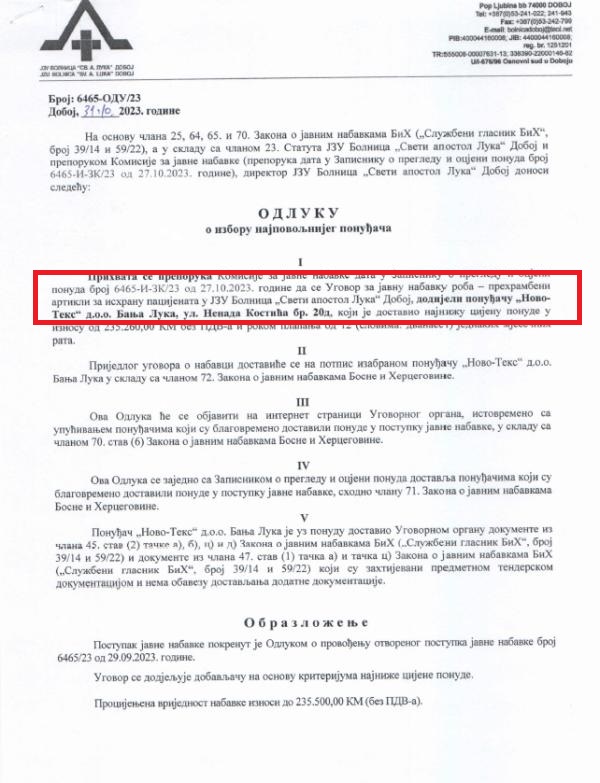
By the first decision dated October 31, a contract worth 235,260 KM (excluding VAT) was awarded to the bidder “Novo-teks” from Banja Luka. The following day, the director made another decision for the procurement of food items amounting to 541,721.90 KM. This time, “Univerzal-Do” from Doboj was selected as the most favourable bidder.
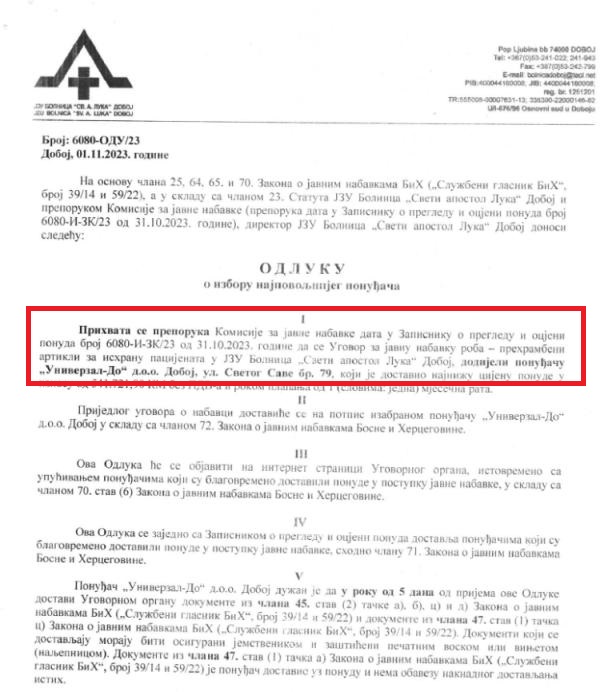
It's logical to ask, say our interlocutors, why two tenders for the same procurement item were announced in such a short time?
Although the product specifications in the tender documentation show that they are not exactly the same products, it's evident that they belong to the same category. Therefore, it would have been logical, and also in accordance with the law, to either announce one tender or, if necessary, divide the procurement into lots.
Moreover, in both cases, the procurement notices stated that the procedure wasn't divided into lots because “it concerns homogeneous goods”. This is somewhat paradoxical because it simultaneously confirms that there was no need to announce two tenders.
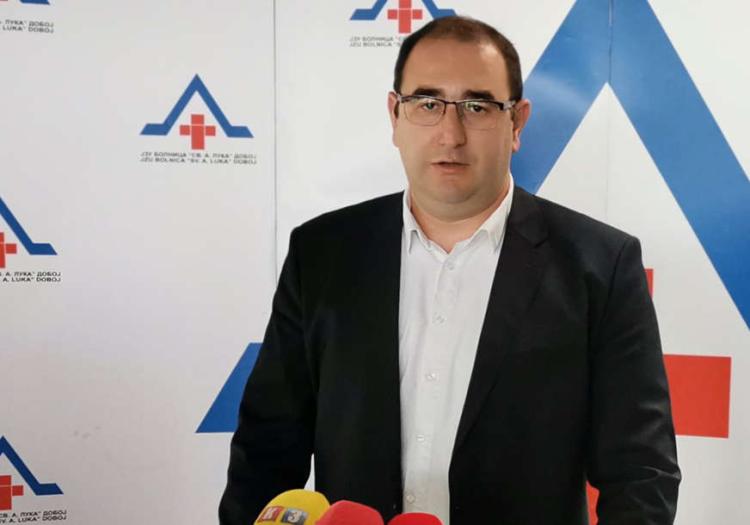
Mladen Gajić / Photo: Srna
Slobodan Golubović, the editor of the “Pratimo tendere” portal, says that there are several elements, in this case, indicating favouritism toward certain bidders.
“There is a splitting of the procurement to satisfy the interests of both companies. Probably behind all this are some illicit agreements, so it's divided in that way. The fact that there was prior cooperation with that contracting authority tells us that these contracts are unlawfully reserved for those bidders. We probably also have contacts with other bidders so that other bidders wouldn't interfere in these procedures because it's very indicative that only one bid is received for food products. Or if the second bid does come, it doesn't meet the requirements, which is why it's rejected, and in the end, there are no appeals against the public procurement procedures”, Golubović says.
Complaining is (Not) Worth It
In addition to the selected bidder, in both cases, another bidder competed in the tender. This was the company “Lala i Laćo” from Bijeljina. The offers from this company in both cases were rejected due to failure to meet the tender conditions – specifically due to formal deficiencies.
The owner of this company, Milivoje Stanivuković, also believes that there is favouritism toward favoured bidders and that it's a matter of an agreement on “job distribution”.
He says they didn't complain because it wouldn't have made sense, given that their bid was rejected as incomplete, but they knew from the start that the tenders were rigged.
“When it comes to Novo-teks and Univerzal Doboj, we have never managed to win a contract because the tender conditions are set up like that. We have situations where articles that haven't been produced for ten years or don't exist at all are requested. Naturally, we can't submit a bid with such articles. There are situations where the article is specified to such an extent that we wouldn't find it on the market for a month or two if it exists at all. Of course, Univerzal submits such a bid, and it goes through”, says Stanivuković.
Once they realize that the tender conditions are set up like this, he says, they submit an incomplete bid just to participate in the process and identify irregularities because they already know that they won't get a job that has been rigged in advance.
“We submit a bid just to confirm suspicions. We don't have time to prepare a proper bid, so we throw in any prices and send it. And then we go to the bid opening to learn something, to confirm suspicions”.
Partnership Worth a Tender
“For years, ‘Univerzal-DO’ has been ‘successfully’ doing business with the ‘Sveti apostol Luka’ hospital”. In 2022, they also secured a public procurement contract for food items worth 476,125.50 KM. In accordance with the tender conditions, the Doboj-based company was the only one to submit a bid.
Even then, Banja Luka's “Novo-teks” was not forgotten, as they received a contract from the Doboj hospital for the procurement of “milk, dairy products”, and other food items worth 177,976 KM. Only one competitor appeared in this tender – the company “Lala i Laćo” from Bijeljina. The Public Procurement Commission rejected the bid from the Bijeljina bidder because it significantly exceeded the estimated value of the procurement. However, it was also found that the bid submitted by “Novo-teks” was incomplete, leading to the decision to cancel and repeat the procedure. Nevertheless, after appeals were lodged, and with the decision of the Appeals Commission, “Novo-teks” secured this contract as well. The fact that the Appeals Commission, under very strange circumstances, ruled in favour of “Novo-teks”, considering the obvious deficiencies in the bid, is not surprising when considering the strong political and business connections of the owner of this company, Nove Milaković.
Milaković has close family and business ties with the President of the Socialist Party of Republika Srpska, Goran Selak. This party is part of the ruling coalition in Republika Srpska, along with Milorad Dodik's SNSD. Many sources claim that this is the secret behind the numerous contracts this company receives through public procurement procedures in this entity. The hospital in Doboj is certainly no exception. While the political connections of the owner of “Univerzal-DO” are not as well-known to the public, their success in public procurement through questionable procedures speaks volumes. Impuls portal
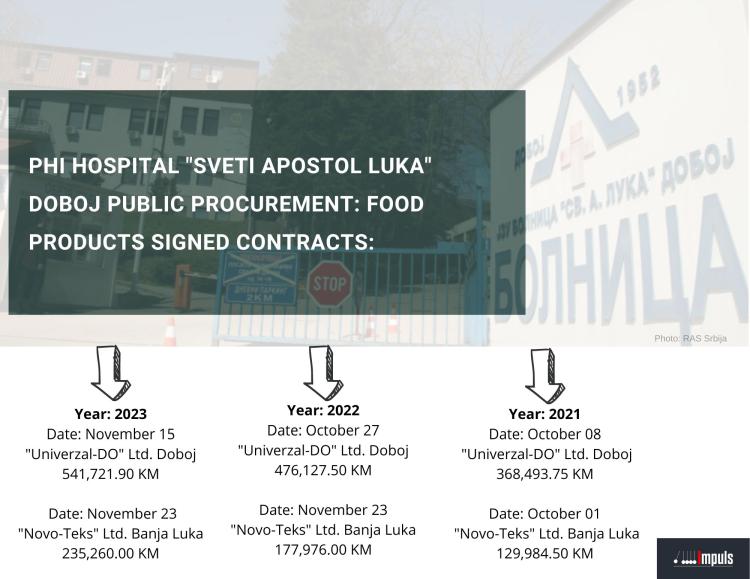 100
100


Komentariši